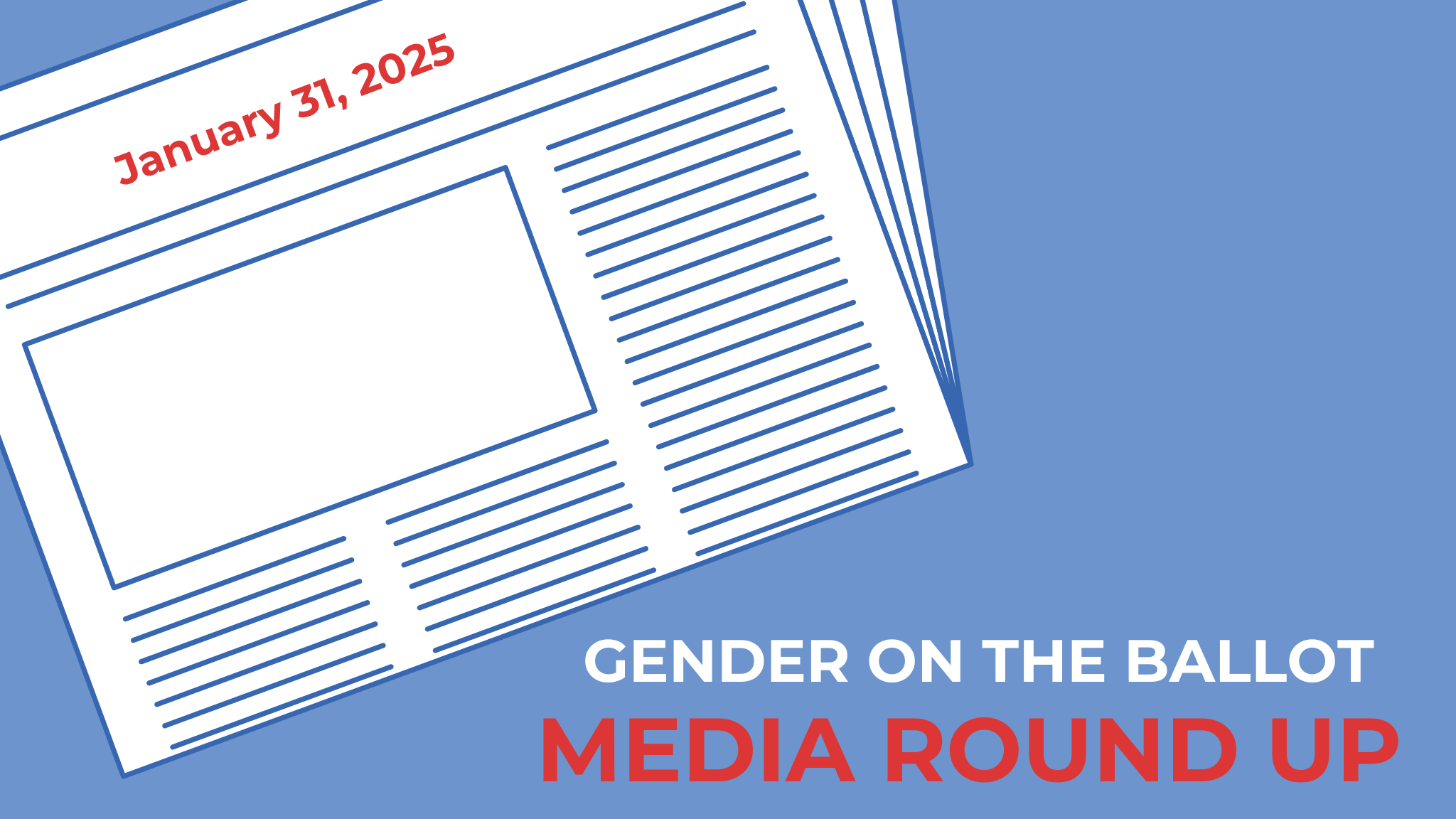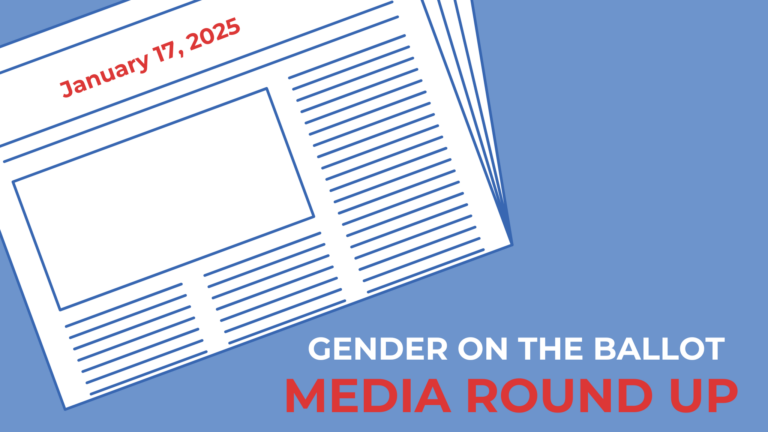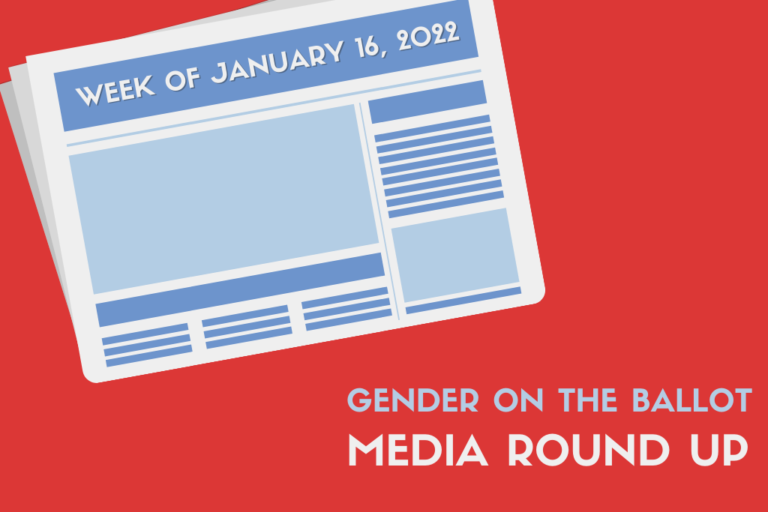Happy Friday! Welcome to the Media Round Up. Each week we’re collecting and sharing our…
Weekly Media Round Up: January 31, 2025

Happy Friday! Welcome to the Media Round Up. Each week we’re collecting and sharing our favorite gender + politics stories. Women are on the move!
Hitting a paywall? Some sources allow a few free articles without a subscription, and your university or local library may offer free access. For example, AU students, faculty, and staff have access to popular newspapers through the library. Click here to learn more.
Kristi Noem Is Confirmed as Homeland Security Secretary
The New York Times, Tim Balk
Former South Dakota Governor Kristi Noem (R) was confirmed as U.S. Secretary of Homeland Security. She served as a House of Representative member from 2011 to 2019, then as South Dakota’s governor from 2019-2025. Noem will oversee agencies key to President Trump’s term goals, including ICE, Custom and Border Security, and the Secret Service. The vote passed 59-34, with seven Senators not voting. She thanked President Trump online, saying she wants to make America safe again.
Arizona’s Governor Appoints First Latina and Black justice to State Supreme Court
AP, Sejal Govindarao and Gabriel Sandoval
Maria Elena Cruz (D) is the first Latina and Black justice appointed to serve in the Arizona state Supreme Court. Governor Katie Hobbs (D) appointed Cruz on Wednesday after the seat was vacant following Justice Robert Brutinel’s (R) retirement in October. Cruz is to be sworn in on Monday, making her a lone Democratic voice in a Republican dominated court. She is from rural Arizona and became interested in law after being involved in a car accident. Cruz received both her bachelor’s degree in psychology in 1998 and law degree in 2001 at the University of Arizona. She’s had a rich career ranging from a criminal defense attorney to a judge in the Yuma County Superior Court, her hometown. Cruz has served as a judge on the Arizona Court of Appeals since 2017.
Melania Trump’s New Portrait Breaks With the Past
The New York Times, Vanessa Friedman
First Lady Melania Trump’s official White House portrait has dropped, and it takes a different tone than previous First Ladies. Traditionally, portraits are in color, the First Lady is smiling, and the background is one that “emphasizes the femininity” of the position. It’s custom to wear pearls and feature flowers behind them. Mrs. Trump’s is the opposite with the Washington Monument in the background, a slight smile, and black and white composition. The First Lady’s 2017 portrait also broke tradition by not featuring the custom elements normally seen, but she was smiling and in color. The new portrait was taken by Régine Mahaux, a Belgian photographer who previously worked with Mrs. Trump.
Karoline Leavitt, the Youngest White House Press Secretary, Makes Her Debut in the Briefing Room
Associated Press, Chris Megerian and Darlene Superville
On Tuesday, White House press secretary Karoline Leavitt made her debut in the briefing room as the public face of the Trump administration. Leavitt, who spent over forty-five minutes answering questions from the White House press corps, promised to speak frequently with news media and open up the briefing room to non-traditional media sources, such as podcasters and social media influencers. The youngest person to ever be named White House press secretary, twenty-seven year old Leavitt previously worked as an intern in the former Trump administration and later became communications director for Rep. Elise Stefanik (R-NY), one of Trump’s “staunchest defenders” in the House.
Kamala Harris Provides a Big Signal About Her Next Move
POLITICO, Eugene Daniels
Though former Vice President Kamala Harris hasn’t made any public decisions about what her political future will look like, she has already established an LLC called Pioneer49 in her home state of California. A disclosure form describes the organization as an “entity to assist the former vice president” which is likely to help “fuel Harris’ next political move.” Harris has kept decisions about her political future close to the vest, but she has reportedly told allies and advisers that she will keep her options open. Per POLITICO, there are three avenues for Harris in the future: run for president again in 2028, run for governor of California in 2026, or decline to run for office and maintain leadership within the Democratic party from the sidelines.
Then and Now: Comparing Trump Administrations and the #MeToo Movement
Eight years ago, President Donald Trump’s first election helped ignite a “reckoning” for powerful men in politics, the business world, and Hollywood, bringing sexual violence to the forefront of national discourse. Trump’s rhetoric regarding women – such as calling female political opponents “nasty” – coupled with general outrage at his election, sparked the #MeToo movement, which enabled women to come forward to name their attackers. Some now wonder, however, if Trump’s second administration will “extinguish” the #MeToo movement: an “ascendant, bellicose view of masculinity championed by Trump reigns supreme,” but the outrage, protests, and marches organized after his first election are not as prevalent. If Trump’s first administration created the “perfect storm” for the #MeToo movement, it appears that his second presidential campaign may have “cemented the backlash to it.”
Trump’s Executive Orders on Sex and Gender
In his first week back in office, President Donald Trump signed a number of executive orders, some of which expound upon his administration’s view of sex and gender. Trump stirred controversy by signing an executive order that only recognizes two sexes: male and female. In response, over 175 organizations that advocate for women’s and transgender rights released a letter blasting Trump’s order. The groups called the policy “cruel” and “lawless,” claiming that it could put people in harm’s way by leading to harassment in transgender and other LGBTQ+ communities. As a result of the executive order, several transgender women incarcerated in federal women’s facilities were moved into isolation and notified that they will be transferred to men’s facilities. One of the transgender women who was notified of her transfer to a men’s prison sued the Trump administration in response, the first known legal challenge to the order. Trump issued another executive order that seeks to define life as beginning at conception rather than birth, confirming the “worst fears” of many reproductive rights advocates: that Republicans, both federally and locally, will be eyeing “aggressive restrictions” by leaning into the religious notion that life begins at conception. This understanding of personhood would require that doctors weigh a fetus’ life as equal to the woman carrying it when making medical decisions, a “chilling” thought for many women.
The Importance of Gender Representation Everywhere
The Air Force Women’s Initiative Team has been forced to close following President Trump’s executive order ending all federal diversity, equity, and inclusion (DEI) programs. The group, founded in 2008, focused on tearing down barriers that women face in Air Force service. Some of their achievements include new equipment specifically made for women, expanding duties for pregnant women, and widening the range of permitted hairstyles to do less scalp damage and better fit helmets. Women were not permitted to fly in combat until 1993, only 32 years ago. Another area that needs more gender representation is the rapidly expanding artificial intelligence (AI) space. This field is developing fast, but women are at risk of being left behind. Women make up only 18% of AI researchers, less than a third of AI professionals, and only 28% of enrollments in AI training. AI could be very useful in the fight towards gender equality, but only if women are adapting to and using the technology. Further, the technology itself has gender bias in it that could be eradicated with women involved in its development. AI has the possibility to advance women’s lives and careers greatly if more gender representation is achieved.
Gloria Estefan to Congress: Support for Women’s Homeless Shelters a ‘No Brainer’
The Hill, Judy Kurtz
At a news conference Thursday just steps from the Capitol, singer Gloria Estefan urged lawmakers to support legislation focused on homelessness and funding for women’s and family shelters. Estefan, a spokesperson for the National Women’s Shelter Network, is asking Congress to pass the Women’s and Family Protection Act, which would increase funding for homelessness support services and women’s and family shelters. “This is one of those issues that I would find hard-pressed for anybody to find a reason not to support,” Estefan said.
A Congresswoman With a Newborn is on a Mission to Modernize the House
The 19th, Grace Panetta
Representatives Brittany Pettersen (D-CO) and Anna Paulina Luna (R-FL) are leading a new resolution to allow proxy voting for new parents in the House. Both women gave birth while active House members, but were not allowed to vote while on leave. Their new resolution aims to allow proxy voting via another House member for up to 12 weeks after one gives birth. They have received pushback from House Speaker Mike Johnson (R-LA) after he said he believes proxy voting to be unconstitutional. Pettersen and Luna remain steadfast in their efforts though and have bipartisan support among other House members. Luna had her child last year, making her just the 12th member of Congress to give birth while in office. Pettersen is the 13th.






